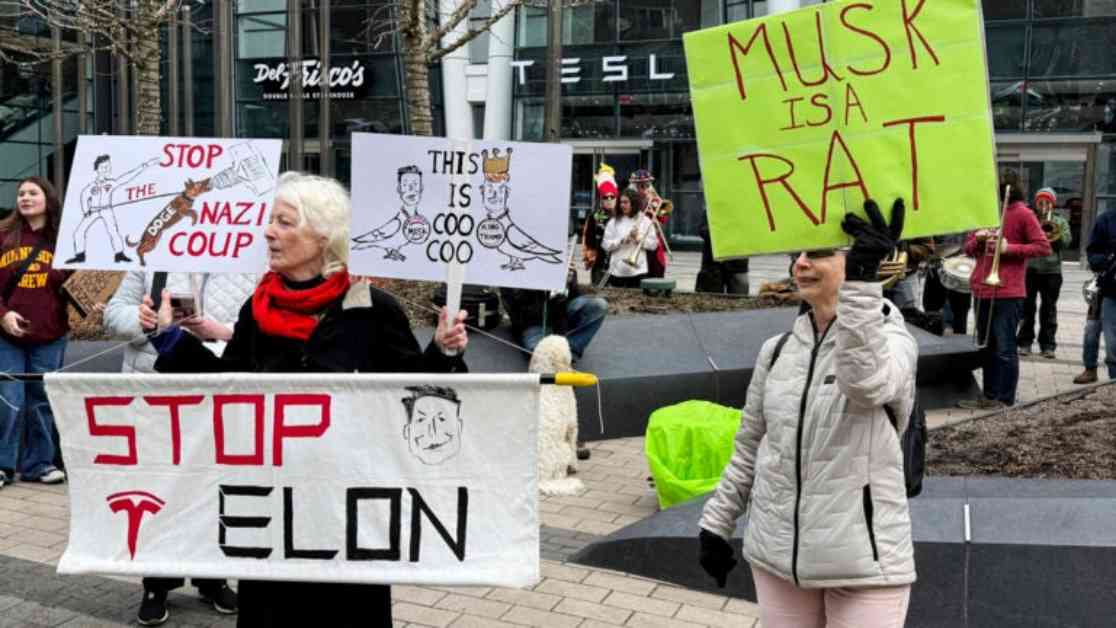Demonstrations erupted outside Tesla stores nationwide on Saturday. Protesters united against Elon Musk, the billionaire CEO, and his efforts to reduce government spending at President Donald Trump’s behest. The collective outrage reflects a mounting backlash across North America and Europe over Musk’s disruptive role in Washington. Critics aim to discourage Tesla purchases and stigmatize the company as the most valuable automaker globally. Liberal groups have orchestrated anti-Tesla protests, rallying against Musk’s Department of Government Efficiency. These events serve to energize Democrats still reeling from Trump’s win last November.
Nathan Phillips, a 58-year-old ecologist from Newton, Massachusetts, shared his resolve at a Boston protest, stating, “We can get back at Elon. We can impose direct economic damage on Tesla by showing up at showrooms everywhere and boycotting Tesla and telling everyone else to get out, sell your stocks, sell your Teslas.” Musk’s directives align with Trump’s push for federal spending cuts and workforce downsizing. He justifies these actions as a mandate from the President to restructure the U.S. government. Musk’s role in DOGE includes accessing sensitive databases, executing federal job reductions, revoking contracts, and shutting down government sections like the U.S. Agency for International Development.
Critics condemn Musk for bypassing Congress’s budget control, perceiving opportunities for self-enrichment. Besides Tesla, Musk heads SpaceX, a company conducting launches for NASA and the intelligence community, and the social media platform X. Despite protests, White House spokesperson Harrison Fields asserts, “Protests will not deter President Trump and Elon Musk from delivering on the promise to establish DOGE and make our federal government more efficient and more accountable to the hardworking American taxpayers across the country.” Tesla declined to comment on the matter.
Over 50 protests were listed on Tesla Takedown’s website, with additional demonstrations planned across the U.S., England, Spain, and Portugal. Recent protests occurred in various U.S. cities, with reports of anti-Semitic vandalism on Tesla vehicles. In Colorado, a woman faced charges linked to vandalizing a Tesla dealership, including hurling Molotov cocktails and spray painting “Nazi cars.” Boston’s rally featured a festive ambiance, complete with music from a brass band, signs, and chants. Protesters conveyed the message that the current government led by Trump and Musk has veered off course, calling for a halt to these actions.
In New York City, about 300 demonstrators gathered at a Tesla dealership, leading to nine arrests by the police. Despite Tesla’s shares dipping since Trump’s inauguration, Musk’s net worth remains substantial at an estimated $359 billion. This marks a significant increase from his 2024 net worth of $195 billion, as reported by Forbes. The rally in Boston and similar events worldwide indicate a global pushback against Musk’s government involvement and Tesla’s standing in the automobile industry.
Amid the ongoing protests and growing discontent, the clash between Musk, Trump, and concerned citizens underscores the intersection of politics, business, and public dissent. The fervor surrounding these events highlights the broader implications of corporate influence on government policies and the need for public accountability. The ongoing demonstrations signal a pivotal moment in reshaping the conversation around corporate responsibility and ethical governance, with Elon Musk and Tesla becoming focal points in this evolving narrative.




